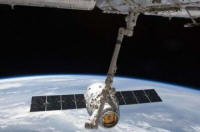|
 U.S.
Air Force certifies SpaceX for national security launches U.S.
Air Force certifies SpaceX for national security launches
 Send a link to a friend
Send a link to a friend
[May 27, 2015]
By Andrea Shalal
WASHINGTON (Reuters) - The U.S. Air Force
on Tuesday said it has certified privately held SpaceX to launch U.S.
military and spy satellites, ending a monopoly held by United Launch
Alliance, a joint venture of Lockheed Martin Corp and Boeing Co, since
its creation in 2006.
|
|
 The decision follows two years of discussions, reviews and legal
disputes between the U.S. Air Force and Space Exploration
Technologies, known as SpaceX, and means the company founded by
entrepreneur Elon Musk, can compete for national security launches
with its Falcon 9 rocket. The decision follows two years of discussions, reviews and legal
disputes between the U.S. Air Force and Space Exploration
Technologies, known as SpaceX, and means the company founded by
entrepreneur Elon Musk, can compete for national security launches
with its Falcon 9 rocket.
"SpaceX's emergence as a viable commercial launch provider provides
the opportunity to compete launch services for the first time in
almost a decade," Air Force Secretary Deborah James said in a
statement.
Leveraging SpaceX's investment in an alternate launch vehicle would
help drive down the cost and help improve the U.S. military's
resiliency, James said.
SpaceX's first opportunity to compete against ULA would come in
June, when the Air Force said it expects to kick off a competition
for launches of additional Global Positioning System III satellites
built by Lockheed.
 The certification, initially expected last December, followed two
years of intensive reviews by the Air Force and SpaceX, which
already has won significant contracts with NASA to launch cargo and
crews to the International Space Station.
The Air Force said it spent more than $60 million and dedicated 150
people to the effort, which included 2,800 discreet tasks, three
certification flight demonstrations, 21 major subsystem reviews and
700 audits aimed at establishing a technical baseline for future
flight worthiness determinations.
Musk called the decision "an important step toward bringing
competition to national security space launch."
Senate Armed Services Committee Chairman John McCain said he hoped
SpaceX's certification would bring down what he called
"unjustifiably high" launch costs and end U.S. reliance on
Russian-built RD-180 engines that power ULA's Atlas 5 rocket.
[to top of second column] |

The U.S. Congress has banned the use of Russian engines for national
security launches after 2019. It passed the law after Russia's
annexation of Ukraine's Crimea region last year.
James called the news "an important milestone" for the Air Force and
the Pentagon. An independent review in March cited a "stark
disconnect" between the two sides about the purpose of the
certification process, and said the Air Force's approach had stifled
the very competition it was seeking to promote.
SpaceX had shocked Air Force officials when it filed a lawsuit in
April 2014 to protest its decision to award 36 rocket launches to
ULA while delaying competition for 14 contracts that were meant to
be open to competition.
The company dropped its lawsuit in January after the two sides
agreed to work collaboratively to wrap up the certification process.
(Reporting by Andrea Shalal; Edtiting by Leslie Adler, Diane Craft
and Lisa Shumaker)
[© 2015 Thomson Reuters. All rights
reserved.]
Copyright 2015 Reuters. All rights reserved. This material may not be published,
broadcast, rewritten or redistributed.
 |